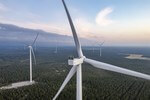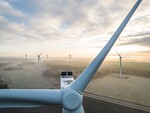03/20/2005
Pakistan approves 25-year energy plan
Pakistan plans to increase its energy generation capacity by 143,000 megawatts in the next 25 years to 162,590 megawatts from the current 19,540 megawatts to sustain higher GDP (gross domestic product) growth rate at 7-8 per cent, sources said. The 25-year Energy Security Plan (ESP 2005-2030) approved recently by President Gen Pervez Musharraf and Prime Minister Shaukat Aziz envisaged increase in nuclear energy generation by 8,400 megawatts to 8,800 megawatts by the year 2030 from current nuclear energy of 400 megawatts, sources in the planning commission said. The planning commission had told the president that unless energy production capacity was increased by 143,000 megawatts in a phased manner over the next 25 years, it would not be possible for the country to sustain higher growth rates in the long run.
The ESP envisaged the share of nuclear energy to increase to 4.2 per cent of country's total energy mix from the current rate of 0.8 per cent. The current energy mix has highest 50 per cent share of gas, 30 per cent oil, 5.5 per cent coal, 12.7 per cent hydel, 0.8 per cent nuclear and zero per cent renewable energy. In overall terms, the government plans to add a total of 143,053-mw electric energy by 2030, thus, the total generation capacity would reach 162,590 megawatts. This addition would include 8,400 megawatts of nuclear energy, 26,200 megawatts hydel-energy, 19,750 megawatts coal based energy, 9,520 megawatts f renewable energy, 1,360 megawatts oil based and 77,820 megawatts gas based energy production.
By the year 2010, the country would have an additional energy of 7,880 megawatts and hence total capacity would reach 27,420 megawatts. This additional energy would not include any new plant in the nuclear sector, but hydel generation would increase by 1,260 megawatts, coal based increase of 900 megawatts and renewable energy increase of 700 megawatts. A minor increase of 160 megawatts would take place in the oil-based generation while gas based energy production would increase by 4,860 megawatts. By the year 2015, the nuclear energy production would increase by 900 megawatts, hydel-energy by 7,570 megawatts, coal based energy by 3,000 megawatts, renewable energy by 800 megawatts, oil based energy by 300 megawatts and gas based energy production by 7,550 megawatts. Total energy production would increase by 20,120 megawatts during this period and total energy generation capacity would reach 47,540 megawatts. In the next five years (2015-2020), the nuclear energy would increase by 1,500 megawatts, hydel-energy would go up by 4,700 megawatts, coal based energy by 4,200 megawatts, renewable energy by 1,470 megawatts, oil-based energy by another 300 megawatts and gas based energy by 12,560 megawatts. In these five years, the energy production would increase by 24,730 megawatts and total capacity would reach 72,270 megawatts.
In the subsequent five-year plan (2020-2025), the nuclear energy production would rise by 2,000 megawatts, hydel energy by 5,600 megawatts, coal based energy to go up by 5,400 megawatts and renewable energy would increase by 2,700 megawatts. Similarly, the oil based energy generation would increase by 300 megawatts and gas based energy by 22,490 megawatts. In this way, a total increase of 38,490 megawatts would take place between the year 2020 to 2025 and total energy generation capacity would touch 110,760 megawatts.
In the next five years (2025-2030) the energy production would increase by 51,830 megawatts and reach a total generation capacity of 162,590 megawatts. This would include an addition of 4,000 megawatts nuclear energy, 7,070 megawatts hydel-energy, coal based energy 6,250 megawatts renewable energy 3,850 megawatts, oil based energy 300 megawatts and gas based energy 30,360 megawatts.
The ESP envisaged the share of nuclear energy to increase to 4.2 per cent of country's total energy mix from the current rate of 0.8 per cent. The current energy mix has highest 50 per cent share of gas, 30 per cent oil, 5.5 per cent coal, 12.7 per cent hydel, 0.8 per cent nuclear and zero per cent renewable energy. In overall terms, the government plans to add a total of 143,053-mw electric energy by 2030, thus, the total generation capacity would reach 162,590 megawatts. This addition would include 8,400 megawatts of nuclear energy, 26,200 megawatts hydel-energy, 19,750 megawatts coal based energy, 9,520 megawatts f renewable energy, 1,360 megawatts oil based and 77,820 megawatts gas based energy production.
By the year 2010, the country would have an additional energy of 7,880 megawatts and hence total capacity would reach 27,420 megawatts. This additional energy would not include any new plant in the nuclear sector, but hydel generation would increase by 1,260 megawatts, coal based increase of 900 megawatts and renewable energy increase of 700 megawatts. A minor increase of 160 megawatts would take place in the oil-based generation while gas based energy production would increase by 4,860 megawatts. By the year 2015, the nuclear energy production would increase by 900 megawatts, hydel-energy by 7,570 megawatts, coal based energy by 3,000 megawatts, renewable energy by 800 megawatts, oil based energy by 300 megawatts and gas based energy production by 7,550 megawatts. Total energy production would increase by 20,120 megawatts during this period and total energy generation capacity would reach 47,540 megawatts. In the next five years (2015-2020), the nuclear energy would increase by 1,500 megawatts, hydel-energy would go up by 4,700 megawatts, coal based energy by 4,200 megawatts, renewable energy by 1,470 megawatts, oil-based energy by another 300 megawatts and gas based energy by 12,560 megawatts. In these five years, the energy production would increase by 24,730 megawatts and total capacity would reach 72,270 megawatts.
In the subsequent five-year plan (2020-2025), the nuclear energy production would rise by 2,000 megawatts, hydel energy by 5,600 megawatts, coal based energy to go up by 5,400 megawatts and renewable energy would increase by 2,700 megawatts. Similarly, the oil based energy generation would increase by 300 megawatts and gas based energy by 22,490 megawatts. In this way, a total increase of 38,490 megawatts would take place between the year 2020 to 2025 and total energy generation capacity would touch 110,760 megawatts.
In the next five years (2025-2030) the energy production would increase by 51,830 megawatts and reach a total generation capacity of 162,590 megawatts. This would include an addition of 4,000 megawatts nuclear energy, 7,070 megawatts hydel-energy, coal based energy 6,250 megawatts renewable energy 3,850 megawatts, oil based energy 300 megawatts and gas based energy 30,360 megawatts.
- Source:
- Online editorial, www.windfair.net
- Author:
- Trevor Sievert, Online Editorial Journalist
- Email:
- press@windfair.net
- Keywords:
- Pakistan, wind energy, renewable energy, wind turbine, wind farm, rotor-blade, onshore, offshore, green energy


























